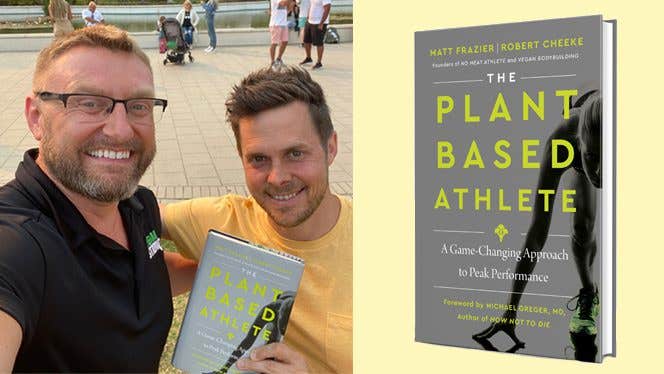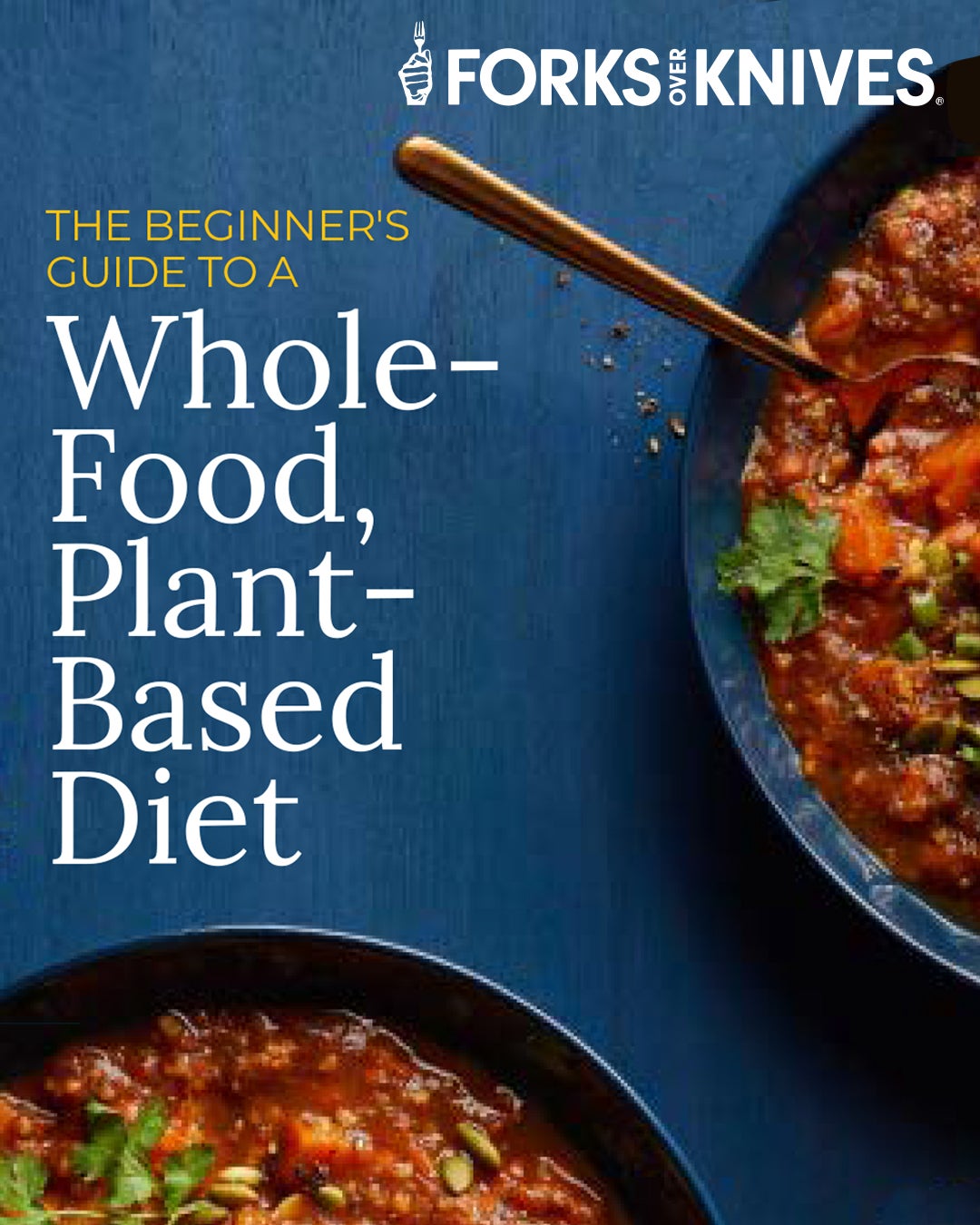
Q&A: Bodybuilder Robert Cheeke, Ultrarunner Matt Frazier on Their New Book for Plant-Based Athletes
Bodybuilder Robert Cheeke (Vegan Bodybuilding) and ultrarunner Matt Frazier (No Meat Athlete) have dedicated their careers to helping other athletes adopt, maintain, and get the most out of a plant-based lifestyle. Now the two have teamed up to deliver the definitive guidebook on the subject. Out June 15, The Plant-Based Athlete details daily routines and go-to recipes from elite plant-based pro athletes such as Rich Roll and Fiona Oakes, and explains the science behind why replacing meat and dairy with whole plant foods can be such a boon for performance and recovery. We spoke with Cheeke and Frazier about the new book, staying fit after 40, and why athletes should stop worrying so much about protein.
What was the impetus behind The Plant-Based Athlete?
Robert Cheeke: My vision for many years has been to tell the compelling stories of the world’s greatest plant-based athletes. With the plant-based diet reaching peak popularity with every passing year, and [with] more and more world-class athletes adopting a plant-based diet, I felt like there was no better time to tell these stories.



GET OUR FREE 20-PG ULTIMATE PLANT-BASED BEGINNER'S GUIDE
Let us guide you to better health
(plus get our most popular recipes!)
Though Matt and I each have our own plant-based athlete journeys in very different sports, which we have shared in our previous books, our new book is all about other athletes—their daily routines, their grocery shopping lists, their recipes, their amazing success stories. Insights from iconic athletes such as Scott Jurek, Fiona Oakes, Rich Roll, Megan Duhamel, Rip Esselstyn, and dozens of others make this book the go-to resource for anyone wanting to get more mileage out of their plant-based diet while leading an active lifestyle.
How have you seen the plant-based movement evolve over the years?
Matt Frazier: In the 12 years since I started No Meat Athlete, the plant-based athlete landscape has completely transformed—for the better—especially in recent years with films like The Game Changers, and athletes who, in some cases, are the best in their sport and choose to eat plant-based diets—often for performance reasons. Legends like Brendan Brazier paved the way for so many of us to build our communities, brands, and businesses centered around a plant-based diet for athletes. Never before have we seen so many mainstream plant-based athletes in major sports leagues like the NBA.
What would you say to people concerned about getting enough protein on a plant-based diet?
RC: In The Plant-Based Athlete, we dedicate an entire chapter to protein, why we don’t need as much as most people assume we do, and why plant protein is actually our preferred source of protein, especially when coming from whole plant foods, which are void of dietary cholesterol yet contain plenty of complex carbohydrates, antioxidants, vitamins, minerals, and fiber. The short answer is that if you consume adequate calories based on your true calorie needs, you will, by default, consume your requisite protein needs. While it’s true that athletes will need more protein than non-athletes, that slightly elevated level can easily be met simply by consuming more calories.
In 2012, I stopped using all sports supplements, and in subsequent years, I have reached my all-time strength and muscle-building results, relying on consuming primarily whole plant foods. And for the past decade, while I have been my all-time biggest and strongest, I have consumed only 10 percent of my total calorie intake from protein, which shows just how practical it is to meet protein needs with a plant-based diet, even for a strength athlete who’s 200-plus pounds.
What types of foods do you eat before and after exercise?
RC: Before I exercise, I want energy to power me through a workout, so I turn to complex carbohydrate foods such as oats, potatoes, rice, or beans, especially if the workout is an hour or more from the time I’m eating my pre-workout meal. If my workout is coming up in an hour or less, I tend to eat fruit, usually bananas, for their quick and easily digestible carbohydrate fuel, and because they are filling and satiating, fairly calorie dense at usually more than 100 calories per large banana, and easy on my stomach, helping me feel full and energized. After a workout, I often eat some fruit right away, for its nourishment and hydration, and then a larger meal like a burrito bowl.
In The Plant-Based Athlete, you interviewed more than 50 world-class plant-based athletes. What were some common nutritional themes that they shared?
RC: One common theme is an emphasis on whole plant foods—lots of potatoes, blueberries, leafy greens, lentils, rice, tofu, and fruits and vegetables of all types. Some take a more deliberate approach to consuming what are often referred to as “superfoods,” but are as common as walnuts and hemp seeds. From talking to so many top athletes, we learned that there isn’t just one approach that works for everyone or a “one size fits all” method, but that different approaches work better for some based on gender, body type, size, calorie needs, and the nature of their sports discipline. (Which speaks to just how remarkable this diet is: there are lots of ways that athletes can do it right.)
The main take-home message is that all the athletes featured in our book consume an exclusively plant-based diet, which helps them have more energy, reduce inflammation, have better recovery, and perform at an optimal level—likely for many years more than [they would] on a typical sports diet, as evidenced by the large numbers of athletes who enjoy a resurgence in their declining careers after they go plant-based.
Now that you're in your 40s, how has your exercise routine changed?
MF: The main difference is that I try to do more in less time. Instead of going out for a three-hour run on the weekends to prepare for a personal ultramarathon best, I’m up early for my kids’ soccer games. So when I run now, I do shorter interval training, and spend much more of my workout time on a daily kettlebell routine that I can knock out in 35 minutes and feel completely energized afterward. But none of this change is due to a slowing down as I age — I’m the strongest I’ve been since I was in college, and it’s hard not to think that 10 years on a 100-percent plant-based diet have something to do with all the energy I feel these days.
Who is The Plant-Based Athlete for?
RC: We wrote this book to be the go-to resource for anyone looking to support their active lifestyle with the benefits of a plant-based diet. You definitely don’t need to consider yourself an athlete to get a ton of value out of The Plant-Based Athlete. It’s for weekend warriors, recreational athletes, and anyone who knows they need to add some more fitness to their lifestyle. This is a complete how-to book, covering plant-based nutrition, meal plans, recipes, and goal-setting, while sharing evidence-based studies and real-life examples from dozens of athletes who have become the best in the world in their sports while fueled by plants. We believe it will have true mainstream appeal as the new all-in-one resource for anyone looking to become the best—and fittest, healthiest, and happiest—version of themselves.
This interview has been edited and condensed for clarity.
About the Author

About the Author
Courtney Davison
Join our mailing list
Get free recipes and the latest info on living a happy, healthy plant-based lifestyle.
By providing your email address, you consent to receive newsletter emails from Forks Over Knives. We value your privacy and will keep your email address safe. You may unsubscribe from our emails at any time.
